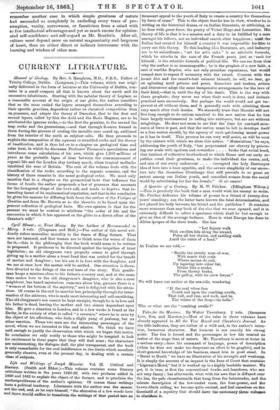Cyril Blount; or, Trust Money. By the Author of Recommended
to • Mercy. 3 vols. (Chapman and Hall.)—The author of this novel evi- dently refers masculine morality to the times of King Saturn. That men are immoral, and that women are to think none the worse of them for it, —this is the philosophy that the book would seem to be written to propound. It professes to be directed against the iniquities of trust legislation ; an old clergyman very properly comes to grief through giving up to a mother alone a trust fund that was settled for the benefit of mother and daughter ; but his son is in love with the daughter, and we see at once how the matter will be settled. Our attention is there- fore diverted to the doings of the real hero of the story. This gentle- man keeps a mistress close to his father's country seat, and at the same time makes love to the old clergyman's daughter, who is also a near neighbour, has heard mysterious rumours about him, guesses there is a "woman at the bottom of the mystery," and is delighted with his atten- tions. Of course in the end he marries her, principally through the inter- vention of the mistress, who is made most interesting and self-sacrificing. The old clergyman's son cannot be kept straight, though he is in love and his father is dead, leaving the mother and two sisters dependent upon him. He gets a situation in London, and in a few weeks is found at the Derby, in the society of what is called "a creature," where he is seen by the object of his affections, who feels a slight pang of jealousy, but no other emotion. These two men are the interesting personages of the novel, whom we are intended to like and admire. We think we have said enough to justify the observation with which we began this notice. In conclusion we only notify to those who might be tempted to look for excitement in these pages that they will find none ; the characters are uninteresting, the dialogue dull, the plot transparent, and the book is only remarkable for the cool indifference to the limits which novelists generally observe, even at the present day, in dealing with a certain class of subjects.






























 Previous page
Previous page